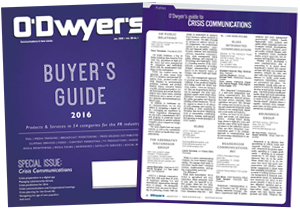|
|
Hashtag hijacking, social live-streaming, email hacks and cyber attacks, superbugs and flash activists: today’s brands face myriad fissures that can burst into full-blown geysers at the speed of a tweet, propelling them into uncharted territory.
As circumstances that feed and amplify the need for crisis communications evolve and multiply, public relations professionals are challenged to keep pace and adapt. Social media listening, rapid and in-kind responses and message development must be deployed as never before. The ever-changing media landscape demands a reconfiguration of strategies and tactics lest practitioners find themselves prey to another year’s “biggest PR blunders.”
|
|
While brands face unprecedented risks and PR pros new trials, certain foundational principles have stood the test of time.
To wit, the wisdom of Benjamin Franklin, born 310 years ago this month. Franklin was a superhero back when our republic was born. I’ve sensed that his profile is diminished of late, but his accomplishments as an author, scientist, statesman, inventor, communicator and diplomat could be compared in breadth and depth to the likes of Da Vinci, Galileo and Newton. So, in honor of his January 17 birthday, let us recognize Benjamin Franklin, one of our Founding Fathers, for instilling in society bedrock principles that all PR practitioners would be wise to remember.
Franklin’s proverbs are embedded in our nation’s lexicon, and some of the best known could have been written with crisis communications in mind: “Glass, china and reputations are easily crack’d, and never well mended”; “An ounce of prevention is worth a pound of cure”; “No gains without pains”; “Haste makes waste”; “A friend in need is a friend indeed”; “A penny saved is a penny earned.”
More to the point, Franklin published a number of adages that serve as the basis for reputation management and crisis communications.
“By failing to prepare, you are preparing to fail.” Every crisis is unique, but strategic preparation will help you take a principled approach rather than flying by the seat of the pants. Communications planning and media training give you the tools needed to create helpful media opportunities, establish a media policy covering digital and social media as well as traditional news media, create visuals, develop or enhance a media monitoring program, secure third-party support, and craft and rehearse responses to important questions.
 “It takes many good deeds to build a good reputation, and only one bad one to lose it.” A trustworthy reputation is your most precious asset. In the event of a crisis, a strong reputation will serve as a bulwark of credibility that will allow you to capture the benefit of the doubt and recover speedily. However, if you fail to respond appropriately, regardless of your reputation, a crisis can destroy your brand. In less dire forms, a crisis could still badly damage your organization and, at the very least, cause misunderstanding and lost revenues and customers.
“It takes many good deeds to build a good reputation, and only one bad one to lose it.” A trustworthy reputation is your most precious asset. In the event of a crisis, a strong reputation will serve as a bulwark of credibility that will allow you to capture the benefit of the doubt and recover speedily. However, if you fail to respond appropriately, regardless of your reputation, a crisis can destroy your brand. In less dire forms, a crisis could still badly damage your organization and, at the very least, cause misunderstanding and lost revenues and customers.
“Never ruin an apology with an excuse.” In a crisis situation, your audiences expect you to demonstrate care and concern for those affected — not to deflect blame, bloviate and further insult. If an apology is appropriate, make it clean, succinct, unequivocal and heartfelt. And don’t make it an afterthought; apologize up front.
“He that speaks much is much mistaken.” When responding to a crisis, it is important not to run on, especially when speaking with media. Windy responses can lead you to speculate, provide unconfirmed facts or new content for the media to target, sound too promotional or bureaucratic, speak on behalf of others, or divert attention from your core messages. Know what you need to say, say it and stop. Once you’ve said too much, you can’t take it back.
“Humility makes great men twice honorable.” In a crisis, your credibility and reputation may be questioned. Trumpeting your successes and achievements is not as powerful as when others sing your praises. If you’re actively building your reputation, you’ll gain relationships with key influencers, who can add credibility to your message and help balance your response. Hold on to your dignity.
“If you will not hear and obey reason she will surely rap your knuckles.” When a crisis strikes, you’ll be in the “hot zone,” between internal pressure to staunch the bleeding and external pressure to respond. These pressures can lead you to overreact precipitously or, worse, freeze. Listen carefully to outside counsel. They are not as emotionally invested as you probably are and more apt to see the forest for the trees.
“There is no little enemy.” Arrogance and dismissiveness can only hurt you. If you don’t take every crisis situation seriously and consider all potential audiences, you risk further damage and negative momentum, which will be more costly and time-consuming to recover from in the end — if ever. Get to know all your stakeholders, and consider what is concerning to each of them. The best managed crises are those which do not see the light of day. Update your crisis scenario plans regularly, especially with consideration to adversaries and potential adversaries.
“Silence is not always a sign of wisdom, but babbling is ever a folly.” Others recognize that still waters run deep. While it is important to make sure your voice is heard in a crisis, both your tone and the way you present are as important as your message and will, in fact, serve to demonstrate your message for good or bad. Rehearse your key messages so they are sincere and succinct. When the time comes to speak, confirm all facts and dispel all lies. Tell the truth as simply as possible. Media training helps you designate appropriate spokespeople, state your point with evidence, conclude with your point intact, then stop talking.
You never know when a crisis will strike or what form it might take, but it is critical for you to prepare for the unexpected and respond quickly and strategically. As innovative technologies and the media landscape continue to evolve, Ben Franklin’s words from more than 300 years ago remain relevant. Take heed or succumb to the maelstrom.
* * *
Michael Fineman is President of Fineman PR in San Francisco.




 There’s a fine line between newsjacking and taking advantage, aka ambulance chasing. Our job as PR professionals is to tread it carefully.
There’s a fine line between newsjacking and taking advantage, aka ambulance chasing. Our job as PR professionals is to tread it carefully. PR firms need to be mindful of ways their work product may be protected by the attorney-client privilege whenever working with a client’s internal legal team or its external legal counsel.
PR firms need to be mindful of ways their work product may be protected by the attorney-client privilege whenever working with a client’s internal legal team or its external legal counsel. Manuel Rocha, former US ambassador and intenational business advisor to LLYC, plans to plead guilty to charges that he was a secret agent for Cuba.
Manuel Rocha, former US ambassador and intenational business advisor to LLYC, plans to plead guilty to charges that he was a secret agent for Cuba. CEO mentoring is an often-overlooked aspect of why CEOs are able to make good decisions, and sometimes make bad ones—all of which intersects with the role and duties of a board.
CEO mentoring is an often-overlooked aspect of why CEOs are able to make good decisions, and sometimes make bad ones—all of which intersects with the role and duties of a board.  How organizations can anticipate, prepare and respond to crises in an increasingly complex world where a convergent landscape of global challenges, threats and risks seem to arrive at an unrelenting pace.
How organizations can anticipate, prepare and respond to crises in an increasingly complex world where a convergent landscape of global challenges, threats and risks seem to arrive at an unrelenting pace.


 Have a comment? Send it to
Have a comment? Send it to 
No comments have been submitted for this story yet.